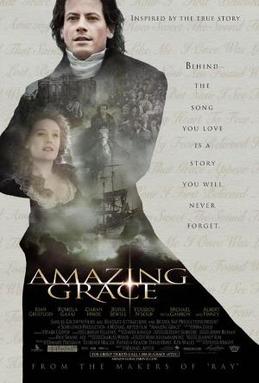"A Poor Wretch Like Me"-William Wilberforce’s “Amazing Grace” (2006)-A Film Review
DVD Review
By Sam Lowell
Amazing Grace, starring Iaon Gruffudd, Romola Garai, Albert Finney, 2006
More than one commentator, especially economic historians not all of them neo-Marxists or leftists, has noted that the bedrock of the American capitalist system was built on the bondage of slavery. Meaning that peculiar combination of slave labor, various plantation products, and mercantile commerce contributed to the accumulation of capital to push the system forward to the next level. Of course if those conditions were truth then since black slavery was introduced into the North American continent early in the 17th century then the mother country, Britain, can also have been to have founded on the lucrative slave trade. All of this to introduce the idea put forth in the film under review, Amazing Grace, of the struggle to abolish the trade in Britain. As the film makes pains to point out even in vaunted democratic countries that abolition would be no easy task when special interests benefited enormously from the trade, directly or indirectly. In America a bloody civil war was necessary and at point that was a close thing as well.
Like many historic movements the struggle to abolish the slave trade had very few adherents at first for a whole lot of political, economic, and social reasons. In this film a key figure, as in the history books, who helped stop the trade in the British Empire was William Wilberforce played here by Iaon Gruffudd. Wilberforce had been just another promising parliamentary politician, a rising star in the ebb and flow of British politics in the late 18th century until he “got religion,” literally got religion through an evangelical conversion since usually when I use this term in quotes I am using it to signal a secular conversion like going from pro-war to an anti-war position, things like that. The key figure in pushing his conversion was the evangelic leader John Newton, played by Albert Finney, a former slave ship captain turned righteous slave trade opponent. Newton was the man who wrote the poem Amazing Grace of the title which later became a hymn among the evangelicals signifying a spiritual conversion-having been lost but now found.
Of course in late 18th Britain, having shortly before lost the key colonial possession of what would become the United States, there were many opponent to the idea of stopping the slave trade from the actual slave-traders to shippers to plantation owners to merchants all well represented in Parliament so Wilberforce and his few early allies were up against some mighty interests. Those interest pushed back, pushed back hard, aided by various court figures who also had an interest in the trade, and so Wilberforce was continually up against it for a long time. Of course at points the success or failure of the effort was driven by other forces as well as when his friend Pitt, the Prime Minister, told him to back off in the 1790s when the British were going toe to toe with French revolutionary forces and needed a united country to beat back the enemy.
This film also deals with various crises of confidence on Wilberforce’s part as he ebbed and flowed in his efforts to stop the trade. Part of his crises stemmed from his chronic ill health and part his desired marriage to Barbara Spooner, played by Romola Garnai, who in the end encouraged him to keep up the fight. So Wilberforce plugged on and in the end through a clever parliamentary ploy was able to get passage of his bill in 1807. Yeah he was blind but now he saw, got that religion I mentioned before. Kudos Brother Wilberforce.

No comments:
Post a Comment